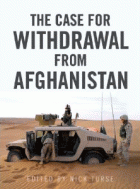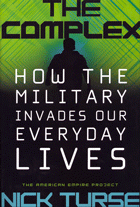It was a moment few noticed on Inauguration Day. It took place just before Donald Trump praised Hillary Clinton to the applause of those assembled for the Inaugural Luncheon. Standing at the microphone, the new president turned, looked toward a table somewhere in the room, and said, “We have so many of our cabinet members here. I see my generals. Generals [who] are going to keep us so safe. They’re going to have a lot of problems [on?] the other side. A couple of them, these are central casting. If I’m doing a movie, I’d pick you generals. General [James] Mattis, who is doing really well. Even Chuck [Schumer] likes General Mattis. And General [John] Kelly...” Assumedly retired Lieutenant General Mike Flynn, Trump’s national security adviser, was also sitting there, with his nominees for secretary of defense and head of the Department of Homeland Security, both confirmed by the Senate that very day.
As with so much that’s Trumpian, however, you can’t simply look at his stream-of-consciousness words as they appear -- always somewhat incoherently -- on the page. You need to note his tone of voice, in this case the almost eroticized possessive pronoun, “my generals,” and the sense of near-awe and self-satisfaction that went with it. Now, pair that reverence for his choices and his generals with the instantly reconfigured WhiteHouse.gov webpage. On Inauguration Day, it promptly lost all its references to climate change, and its sections on the LGBT community and civil rights, but gained a new section on The Donald’s America First Energy Plan (“For too long, we’ve been held back by burdensome regulations on our energy industry...”) and another touting an America First Foreign Policy. From that one, you can already learn something about what “my generals” are going to be doing in the age of Trump. (“Defeating ISIS and other radical Islamic terror groups will be our highest priority. To defeat and destroy these groups, we will pursue aggressive joint and coalition military operations when necessary.”) Also emphasized were the many taxpayer dollars to be invested in giving those generals plenty to do it with. (“[W]e will rebuild the American military. Our Navy has shrunk from more than 500 ships in 1991 to 275 in 2016. Our Air Force is roughly one third smaller than in 1991. President Trump is committed to reversing this trend, because he knows that our military dominance must be unquestioned.”) And as a final nostalgic touch for a man who wants to make American great again, it looks like one of the true boondoggles of the military-industrial complex, dubbed “Star Wars” back in 1983 by President Ronald Reagan, will return to Washington in the age of Trump -- developing a “state of the art missile defense system to protect against missile-based attacks from states like Iran and North Korea.”
Now, as to that movie Donald Trump would like to make with those generals from central casting and all those dollars heading for the Pentagon and those missiles to come: Why not call it American Carnage? As retired Air Force Lieutenant Colonel William Astore, a TomDispatch regular, points out today, this country is already well primed for just such a grim project. Tom
The Dark [K]night of Donald Trump
Weapons, Warriors, and Fear as the New Order in America
By William J. AstoreI came of age during America's Cold War with the Soviet Union, witnessing its denouement while serving in the U.S. military. In those days, the USSR led the world's weapons trade, providing arms to the Warsaw Pact (the military alliance it dominated) as well as to client states like Cuba, Egypt, and Syria. The United States usually came in second in arms dealing, a dubious silver medal that could, at least, be rationalized as a justifiable response to Soviet aggression, part of the necessary price for a longstanding policy of “containment.” In 1983, President Ronald Reagan had dubbed the Soviet Union an "evil empire" in part because of its militarism and aggressive push to sell weaponry around the globe, often accompanied by Soviet troops, ostensibly as trainers and advisers.
After the USSR imploded in 1991, dominating the world’s arms trade somehow came to seem so much less evil. In fact, faced with large trade deficits, a powerful military-industrial complex looking for markets, and ever more global military commitments, Washington actively sought to promote and sell American-made weaponry on a remarkable scale. And in that it succeeded admirably.
[Note to TomDispatch Readers: On a day when we have a powerful new piece by John Feffer, I just wanted to remind you to pick up a copy of his remarkable dystopian novel, Splinterlands, the latest in Dispatch Books’ series of original works. Barbara Ehrenreich wrote of it: “A startling portrait of a post-apocalyptic tomorrow that is fast becoming a reality today. Fast-paced yet strangely haunting.” If you’ve already bought a copy, then pick another up for a friend and give this website a bit of extra support in our future publishing endeavors. Alternatively, if you go to the TomDispatch donation page and contribute $100 ($125 if you live outside the USA), Feffer will send you a signed, personalized copy of the book. It’s one hell of a novel, as well as a kind of owner’s manual for the age of Trump. And keep in mind that, as you might imagine, TD needs all the help it can get in 2017.
Finally, if (like me) you happen to live in New York City, Feffer will be at the New School on the evening of February 16th to discuss Splinterlands with TD author William Hartung. Hope you’ll join me there! For the details on that event, click on this link. Tom]
In a sense, the damage is already done and who can doubt that what follows will be a demolition derby -- with an exception almost too obvious to mention. In the pre-inaugural period, one simple fact of the Trumpian accession stood out boldly: just about every one of his appointees to a non-national-security post was prepared to rip his or her agency (or its mission) to shreds. Former Texas Governor Rick Perry essentially had to apologize for once claiming that he’d like to abolish the Energy Department, which he is now to head. Former Oklahoma Attorney General Scott Pruitt, historically in the pay of big energy, is to take over the Environmental Protection Agency, which he sued 14 times in his home state and challenged fiercely about its desire to protect the environment. Betsy DeVos, prospective head of the Department of Education, would like to tear up those “failing government schools” and turn “public” education into a voucher-driven phenomenon. Tom Price, the soon-to-be head of Health and Human Services, not only wants to rip out Obamacare at the roots, but essentially cripple Medicaid and Medicare, too. And though we have no details yet on labor secretary nominee Andrew Puzder’s plans, given his record and his views (he’d like to replace workers with machines that don’t take vacations), it’s easy enough to guess that he will prove another dismantler.
And so it’s likely to go in Donald Trump’s version of America. The first news from his administration’s budget front, for instance, indicates that an axe will soon be taken to the departments of commerce, energy, justice, transportation, and state. In addition, the Hill reports, "The Corporation for Public Broadcasting would be privatized, while the National Endowment for the Arts and National Endowment for the Humanities would be eliminated entirely."
As I mentioned, however, there is a major exception to all of this that fits well with essential Republicanism in these years -- a “small government” philosophy until you reach the oppressive powers of the state and then “big” doesn’t even cover it. So the major exceptions to all this will be the U.S. military and the Department of Homeland Security (that wall!). At the inaugural concert, Donald Trump once again emphasized that money will indeed flow in ever-increasing amounts into reversing the supposed “very sad depletion of our military.” (“We’re going to build up our great military. We’re going to build it up. We’re going to strengthen our borders.”) In other words: for the civilian side of the government, no, but for the Defense Department, it’s thumb’s up all the way.
If you thought Washington had a military-first policy in these last years, just wait. In essence, there may not be much left but the military to make policy with. Keep that in mind as TomDispatch regular John Feffer, author of the unforgettable new dystopian novel Splinterlands, the latest Dispatch Book, explores how Donald Trump plans to blow up the present world order, backed by that “great military” and that “big, fat, beautiful wall,” and give birth to a new internationalism led by a global confederacy of oligarchs. It’s a daunting vision on an increasingly daunting planet. Tom
Donald Trump Against the World
The Birth of a New Nationalist World Order
By John FefferDonald Trump is a worldly fellow. He travels the globe on his private jet. He’s married to a Slovene and divorced from a Czech. He doesn’t speak any other languages, but hey, he’s an American, so monolingualism is his birthright.
His fortune depends in large part on the global economy. He has business interests in nearly two-dozen countries on four continents. Many of the products anointed with the Trump brand roll off a global assembly line: Trump furniture made in Turkey and Germany, Trump eyeglasses from China, Trump shirts via Bangladesh and Honduras (among other countries). Just as wealthy Americans often slight the role the domestic infrastructure has played in the making of their fortunes, Trump routinely disregards how much his depends on the infrastructure of the global economy.
The new president's cabinet nominees are a similarly worldly lot, being either generals or multi-millionaires (or both), or simply, like their president, straight-out billionaires. Rich people jet off to exotic places for vacations or to make deals; generals are dispatched to all points of the compass to kill people. With an estimated net wealth of more than $13 billion, Trump’s cabinet could be its own small island nation. Make that a very aggressive island nation: the military men in his proposed cabinet -- former generals Mike Flynn (national security adviser), James Mattis (defense secretary), and John Kelly (head of Homeland Security), as well as former Navy Seal Ryan Zinke (interior secretary) -- have fought in nearly as many countries as Trump has done business.
As worldly as they might be, Trump’s nominees don’t look much like the world. Mostly rich white men, they look more like the American electorate... circa 1817. Still, the media has bent over backward to find as much diversity as it could in this panorama of homogeneity. It has, for instance, identified the nominees according to their different ideological milieus: Wall Street, the Pentagon, the Republican Party, the lunatic fringe.
In this taxonomy of Trumpism, the media continues to miss the obvious. The incoming administration is, in fact, united around one key mission: it’s about to declare war on the world.
The Future by Committee
The Collective "Wisdom" of the U.S. Intelligence Community
By Tom Engelhardt
They call themselves the U.S. “Intelligence Community,” or the IC. If you include the office of the Director of National Intelligence (ODNI), which in 2005 began as a crew of 12 people, including its director, and by 2008 had already grown to a staff of 1,750, there are 17 members (adding up to an alphabet soup of acronyms including the CIA, the NSA, and the DIA). The IC spends something like $70 billion of your taxpayer dollars annually, mostly in secret, hires staggering numbers of private contractors from various warrior corporations to lend a hand, sucks up communications of every sort across the planet, runs a drone air force, monitors satellites galore, builds its agencies multi-billion-dollar headquarters and storage facilities, and does all of this, ostensibly, to provide the president and the rest of the government with the best information imaginable on what’s happening in the world and what dangers the United States faces.
Since 9/11, expansion has been the name of its game, as the leading intelligence agencies gained ever more power, prestige, and the big bucks, while wrapping themselves in an unprecedented blanket of secrecy. Typically, in the final days of the Obama administration, the National Security Agency was given yet more leeway to share the warrantless data it scoops up worldwide (including from American citizens) with ever more members of the IC.
And oh yes, in the weeks leading up to the inauguration of Donald Trump, several of those intelligence outfits found themselves in a knock-down, drag-out barroom brawl with our new tweeter-in-chief (who has begun threatening to downsize parts of the IC) over the possible Russian hacking of an American election and his relations with Russian President Vladimir Putin. In the process, they have received regular media plaudits for their crucial importance to all of us, our security and safety, along with tweeted curses from the then-president-elect.
Let me lay my own cards on the table here. Based on the relatively little we can know about the information the Intelligence Community has been delivering to the president and his people in these years, I’ve never been particularly impressed with its work. Again, given what’s available to judge from, it seems as if, despite its size, reach, money, and power, the IC has been caught “off-guard” by developments in our world with startling regularity and might be thought of as something closer to an “un-intelligence machine.” It’s always been my suspicion that, if a group of smart, out-of-the-box thinkers were let loose on purely open-source material, the U.S. government might actually end up with a far more accurate view of our world and how it works, not to speak of what dangers lie in store for us.
In case you hadn’t noticed, someone recently loosed a satirist in American politics. Let me give you an example. You remember FBI Director James Comey, who gained a certain notoriety by stepping into the limelight 11 days before the recent presidential election via a very publicly dispatched letter to the Congressional leadership. It focused on an FBI investigation into emails from Hillary Clinton believed to be on a computer that disgraced former Congressman Anthony Weiner shared with his wife and Clinton aide Huma Abedin. As Comey admitted three days before the election, when it came to that investigation, there was no there there. This seeming non-event about an investigation of no significance would, in fact, prove historic. It represented the first intervention by the national security state, that ever more powerful fourth branch of our government, in an American election campaign and might well have played a role in putting Donald Trump in the Oval Office. (Just last week, the Justice Department’s Office of the Inspector General announced that it would look into the FBI’s investigation of Clinton’s email and, in particular, whether Comey’s late-in-the-day intervention “violated policy or procedure when he sent Congress notification about new evidence his department had discovered.”)
You may by now be wondering where the promised satire is, but be patient. Comey made his first public appearance since his pre-election dramatics at a recent Senate hearing and was asked whether the FBI might be investigating possible ties between Russian officials and the Trump campaign. In response, he offered this: "I would never comment on investigations -- whether we have one or not -- in an open forum like this, so I can't answer one way or another.”
Of course he wouldn’t! As Senator Angus King of Maine responded (in an understated but tickle-your-ribs fashion that would have been quite suitable for Saturday Night Live), "The irony of your making that statement, I cannot avoid."
Indeed, who could? In the Trump era, we now clearly live in a world created expressly for SNL. But instead of belaboring the point, let me turn you over to TomDispatch regular William deBuys so he can outline the series of absurdist events that gave us our new huckster-in-chief, our very own billionaire in the Oval Office in what can only be termed the most improbable election of the 1% era of American politics or perhaps any era at all. Tom
New From Trump University
Election Rigging 101
By William deBuysDonald Trump was right. The election was rigged. What Trump got wrong (and, boy, does he get things wrong) is that the rigging worked in his favor. The manipulations took three monumental forms: Russian cyber-sabotage; FBI meddling; and systematic Republican efforts, especially in swing states, to prevent minority citizens from casting votes. The cumulative effect was more than sufficient to shift the outcome in Trump’s favor and put the least qualified major-party candidate in the history of the republic into the White House.
Trumpist internet trolls and Trump himself dismiss such concerns as sour grapes, but for anyone who takes seriously the importance of operating a democracy these assaults on the nation’s core political process constitute threats to the country’s very being. Let’s look at each of these areas of electoral interference in detail.
Heading into the Trump era, our American world already feels like it’s overheating badly. The headlines careen from the president-elect’s tweets against Meryl Streep (“one of the most over-rated actresses in Hollywood...!”) to conflicts over conflicts of interest to secret briefings by the intelligence community on highly compromising (but unsubstantiated and possibly completely insubstantial) “personal and financial information” about the president-elect supposedly gathered by the Russians, including sex videos of him with prostitutes in Moscow (“‘kompromat,’ or compromising material, with the possible goal of blackmailing Mr. Trump in the future”). The Trump-Russian “dossier,” paid for by his political opponents, including claims about contacts between his campaign and Russian officials, has reportedly been circulating for some time “among intelligence agencies, senior members of Congress, and other government officials in Washington.”
In such an extreme hothouse atmosphere, it’s not surprising when even the most curious of figures can start to look like -- as one former State Department official testifying before Congress put it recently -- a “stabilizing and moderating force, preventing wildly stupid, dangerous, and illegal things from happening.” That was Eliot Cohen discussing retired Marine General James “Mad Dog” Mattis, Trump’s nominee for secretary of defense, and it’s true that if you’re comparing him to retired Lieutenant General Michael Flynn, the new national security adviser, or Mike Pompeo, the prospective head of the CIA, Mattis may indeed look remarkably sane and even moderate.
But let’s try to keep things in perspective. Recently, the Washington Post featured a piece by Greg Jaffe and Adam Entous on General Mattis’s tenure as the head of U.S. Central Command that, amid the screaming headlines of this moment, came and went unnoticed. Embedded in it was this little gem: in 2011, when Iranian-backed insurgents in Iraq, using Iranian-supplied rockets, were killing American troops, Mattis grew increasingly incensed. As a result, he formulated a plan, which made it to (and was rejected by) the Obama White House, to launch a direct American “dead-of-night” attack on Iran either to take out a power plant or an oil refinery. This “World War III scenario” -- the willingness to take a chance, that is, on sparking a regional conflagration -- and the urge to act preemptively (including against “Iranian swarm boats” in the Persian Gulf) finally led to his being replaced as CENTCOM commander five months early.
This, then, is what we know of the man generally agreed to be the sanest, most down-to-earth figure on Trump’s national security team. Keep that in mind as TomDispatch regular Michael Klare takes us on a quick tour of our present planetary hot spots (including Iran), any of which could blow sky high as Donald Trump and his team of “mad dogs” take office. Tom
Escalation Watch
Four Looming Flashpoints Facing President Trump
By Michael T. KlareWithin months of taking office, President Donald Trump is likely to face one or more major international crises, possibly entailing a risk of nuclear escalation. Not since the end of the Cold War has a new chief executive been confronted with as many potential flashpoints involving such a risk of explosive conflict. This proliferation of crises has been brewing for some time, but the situation appears especially ominous now given Trump’s pledge to bring American military force swiftly to bear on any threats of foreign transgression. With so much at risk, it’s none too soon to go on a permanent escalation watch, monitoring the major global hotspots for any sign of imminent flare-ups, hoping that early warnings (and the outcry that goes with them) might help avert catastrophe.
Looking at the world today, four areas appear to pose an especially high risk of sudden crisis and conflict: North Korea, the South China Sea, the Baltic Sea region, and the Middle East. Each of them has been the past site of recurring clashes, and all are primed to explode early in the Trump presidency.
Why are we seeing so many potential crises now? Is this period really different from earlier presidential transitions?



















